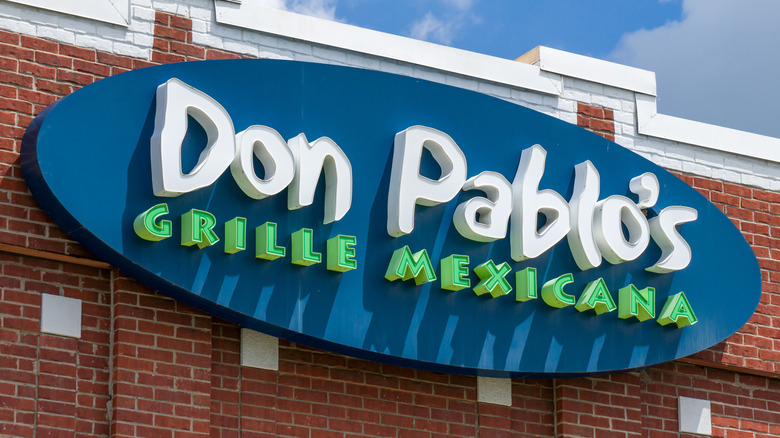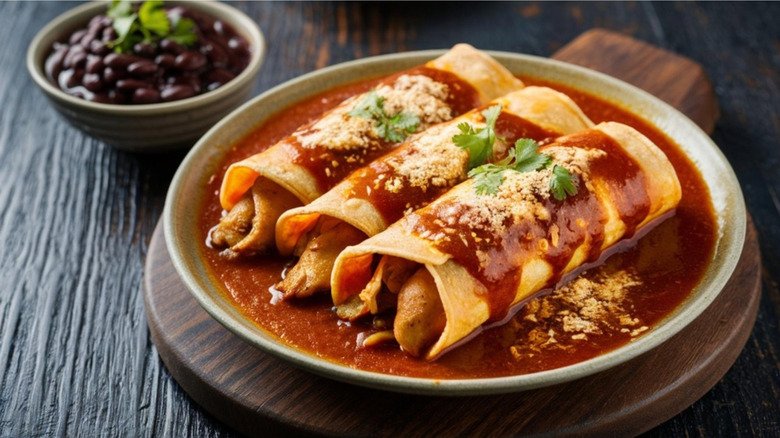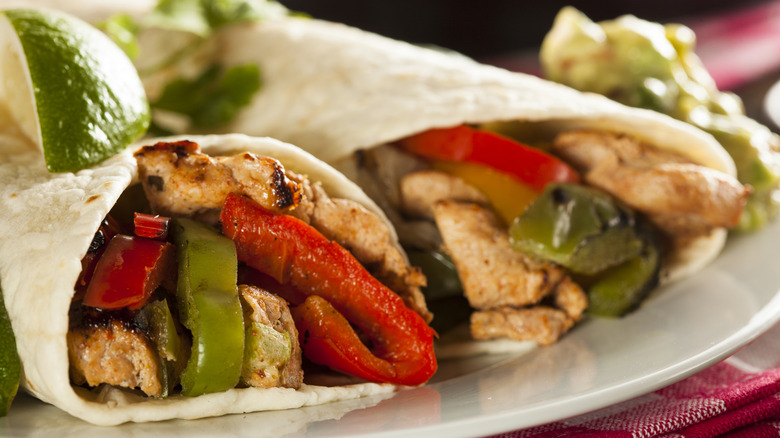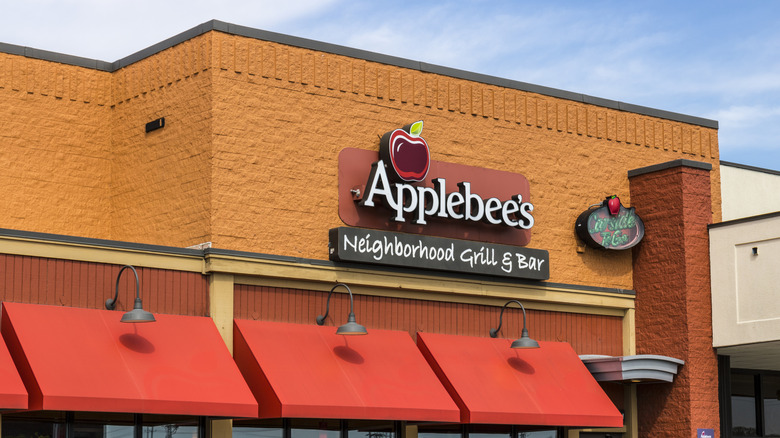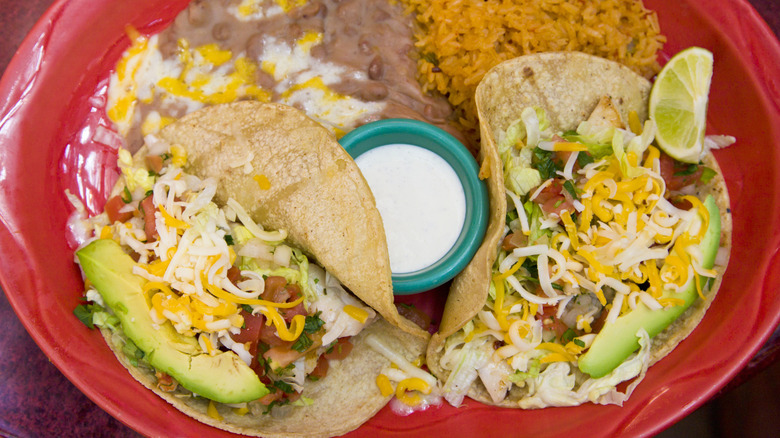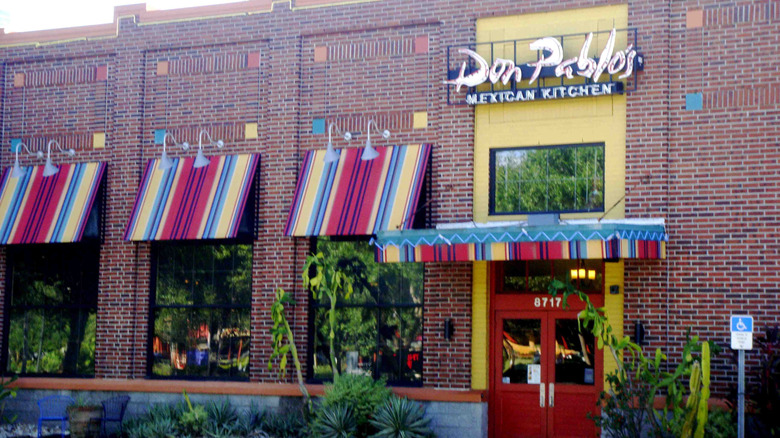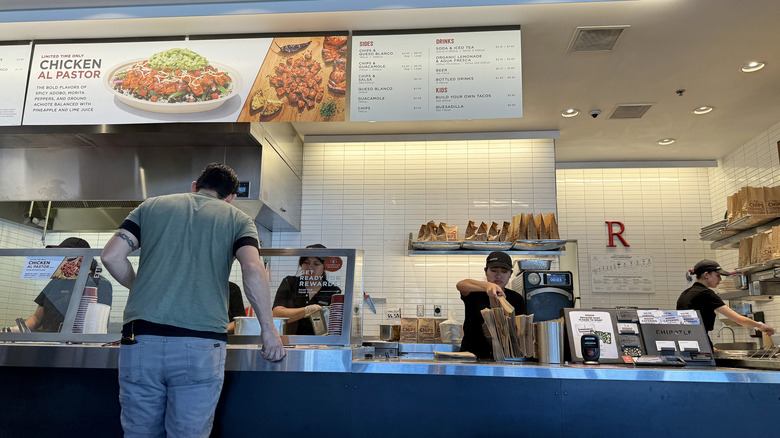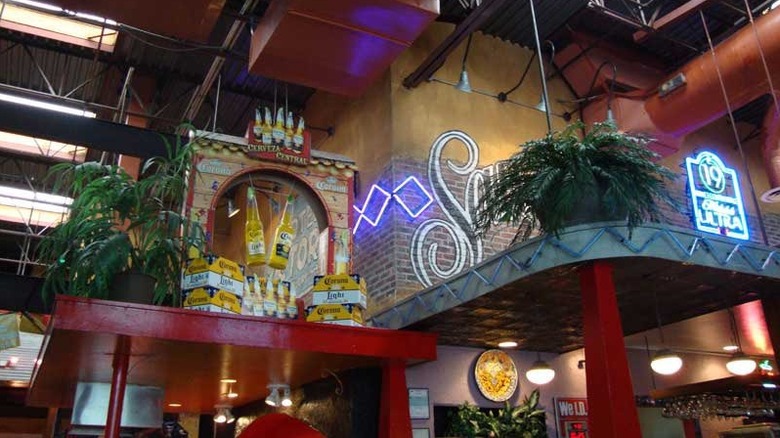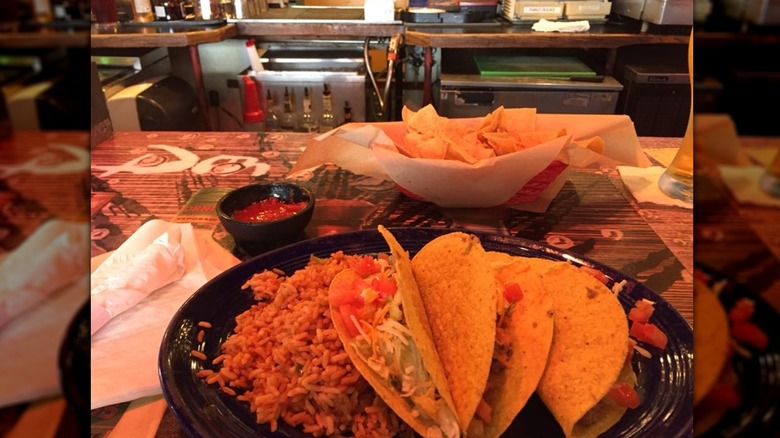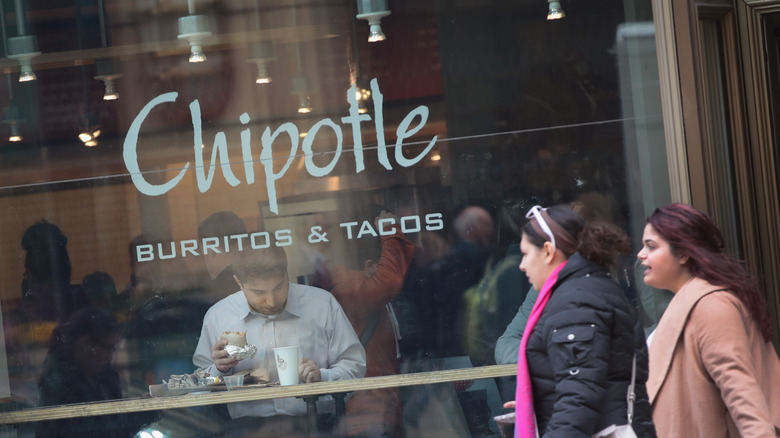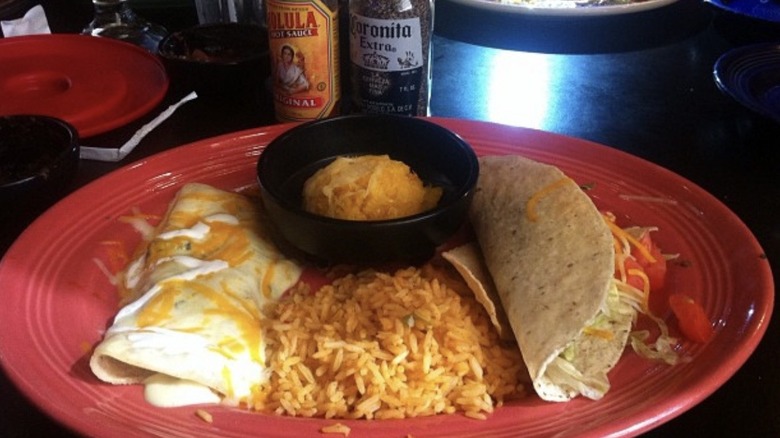The Rise And Fall Of Don Pablo's
Running a restaurant is a rocky business. In recent years, we've seen multiple chains throw in the towel after an onslaught of financial hardships. Back in the 2010s, Don Pablo's was one of these casualties. The once almighty Tex-Mex chain spent decades doling out tacos and fajitas made with its homemade flour tortillas, but unfortunately fell foul of some of the most common pitfalls of running and expanding a national chain.
Unlike its greatest rival, Chi-Chi's — which itself shuttered in 2004 after declaring bankruptcy and being hit by the largest hepatitis A outbreak in American history within a matter of weeks but has since announced a surprise comeback — it seems like Don Pablo's is officially gone for good. Considering how fast the chain grew in its prime, we were always somewhat surprised by its dramatic downfall. However, once you dig into Don Pablo's history, its decline (and end) feel somewhat inevitable. From its origins in Lubbock, Texas, through its peak in the 1990s, all the way to its total closure in 2019, let's dive into the rise and fall of Don Pablo's.
The first Don Pablo's made its debut in 1985
Don Pablo's first hit the scene in 1985. The brainchild of DF&R Restaurants Inc., its inaugural restaurant opened in Lubbock, Texas, offering a range of classic Tex-Mex cuisine, right as the term began to hit the mainstream. While the concept of Tex-Mex — aka an American regional cuisine, putting a Texan flair on classic Mexican dishes — had been a thing for decades, the 1980s saw a huge uptick in restaurants embracing the label.
The restaurant offered all the typical Tex-Mex staples. Menus were packed with the likes of tacos, fajitas, nachos, salads, and Don Pablo's signature margaritas, made with fresh lime juice, while its flour tortillas were made fresh throughout the day at its in-house tortilla stand, all served cafeteria-style. While it was nothing totally different from the likes of its rivals, including Chi-Chi's (which had a headstart on the Tex-Mex scene, having made its debut exactly a decade earlier), it clearly struck a chord with the stomachs of its customers as it soon began to grow, with the Lubbock location becoming the first of many Don Pablo's restaurants.
New Don Pablo's locations quickly opened throughout Texas
The Don Pablo's in Lubbock was soon joined by a long list of additional locations in Texas. With its inaugural restaurant proving a success, DF&R Restaurants Inc. expanded the chain at a rapid rate, adding new restaurants in Texas (Lubbock, Bedford, Arlington, Fort Worth, and Dallas to be specific), before moving on to the Midwest.
By 1995, Don Pablo's had grown to 51 locations across Texas, New Mexico, Kentucky, Ohio, Oklahoma, Michigan, Indiana, Virginia, and Maryland. This number had nearly doubled by 1998 when those looking for tasty Tex-Mex could choose from 96 Don Pablo's restaurants. In parallel with its success, DF&R Restaurants decided to go public in 1993. "DF&R is in the top tier of fast-growth restaurant companies," David Adelman, a restaurant industry analyst with Dean Witter Reynolds, told the Chicago Tribune in 1994. The chain was also praised for deciding to double down on Tex-Mex as part of its growth plans.
Don Pablo's was bought out by an Applebee's franchisee in 1995
As is usually the case for fast-growing businesses, Don Pablo's soon caught the eye of potential buyers. In 1995, just 10 years after its first restaurant opened in Lubbock, the parent company of the Tex-Mex chain was bought out by Apple South Inc. At the time, Apple South was one of the largest franchisees of another popular casual dining chain, Applebee's, retaining a whopping 264 locations across the U.S.
With Don Pablo's continuing to thrive, Apple South ultimately decided to ditch all 264 of these restaurants, plus its other franchise restaurants, just two years later. The plan was to go all in on Don Pablo's and three of its other properties – Hops Restaurant Bar & Brewery, McCormick & Schmick's, and Canyon Cafe Southwestern Grills — which were all growing at a considerably faster rate. Apple South even decided to change its name in the process, adopting the new moniker of Avado Brands Inc. to reflect its newly non-Applebee's-focused portfolio in 1998.
Don Pablo's established itself as a Mexican food favorite in the 1990s
The 1990s were undeniably Don Pablo's peak. Not only was it opening restaurants left, right, and center, but it had also established itself as one of the biggest names in the biz. At one point, Don Pablo's boasted an impressive 120 locations, making it the second-biggest full-service Mexican restaurant chain in the U.S. after Chi-Chi's.
Those who dined or worked at the restaurant during its glory days remember it fondly. "I loved when they made the tortillas in front of us as a kid," reminisced one former customer on Reddit. "Sometimes the chef would give out dough for us to play with too." Another user remembers their local Don Pablo's boasting a working fountain in the middle of the restaurant (in their own words, "it was MAGNIFICENT"). The atmosphere was integral to its success for many people, with one user comparing it to "a mini Disney EPCOT," but the food also played a big role, with The Real Margarita, Three Amigos Enchiladas, and Chocolate Volcano Cake all heralded as tasty standouts.
Avado Brands filed for bankruptcy twice in the 2000s
They say that all good things come to an end. For Avado Brands, the skyrocketing success of Don Pablo's ground to a halt at some point in the late 1990s and early 2000s. The company filed for bankruptcy not once, but twice. The first time came in February 2004, following what was described as several years of financial struggles. At this point, it had already sold its McCormick & Schmicks and Canyon Cafe Southwestern Grills restaurants, leaving just Don Pablo's and Hops Restaurant Bar & Brewery (then known as Hops Grill & Brewery) in its portfolio.
While Avado Brands managed to exit bankruptcy the following year with 96 Don Pablo's restaurants still in operation, it was a short reprieve. The company filed for a second time in 2007, at which point it had between $1 million and $100 million in liabilities. As per its bankruptcy filings, it had generated $227.8 million in revenue in the 12 months preceding July 31, 2007, with a loss of $7.8 million. Don Pablo's had a lineup of 91 restaurants when it filed for Chapter 11 bankruptcy, with the company promising that they would operate as usual in the meantime. It also stated that it would auction off its assets to "a better capitalized entity allowing for all of Avado's restaurants to achieve their potential," (via Nation's Restaurant News).
The chain suddenly faced new Mexican dining rivals
Nowadays, about one in 10 restaurants in the U.S. serve Mexican food. Back when Don Pablo's entered the comparably infantile market in the 1980s, however, some of the biggest names in today's flourishing Tex-Mex scene didn't even exist yet. But then the 1990s hit. Right as Don Pablo's hit its peak, several of the restaurant chains that now dominate Tex-Mex opened their first stores and undertook rapid expansions that inevitably began to snatch sales.
This included fast-casual staple Chipotle, which opened its first restaurant in Denver in 1993 and ended the decade with investment from fast food giant McDonald's. QDOBA, then known as Zuma Fresh Mexican Grill, debuted in 1995 (coincidentally, also in Denver). Meanwhile, restaurants that had existed for decades — such as Del Taco, which had recently rebounded after entering into bankruptcy early in the 1990s — accelerated their expansion plans. All in all, the Tex-Mex sector was thriving, but that inevitably made it all the harder for smaller chains like Don Pablo's to secure a piece of the pie.
Sales plummeted from 2001 to 2010
Considering the fact that its parent company filed for bankruptcy twice, it should come as no surprise that sales plummeted for Don Pablo's during the early 21st century. The once burgeoning chain — which took in approximately $268 million in 2001 — made a comparably measly $81 million in 2010. Experts attributed this to the aforementioned increased interest in fast casual dining, with Brian Connors, a restaurant consultant with Connors Davis & Co., telling the Sarasota Herald-Tribune, "The problem is the consumers' palates have changed since Don Pablo's emerged. People now gravitate toward restaurants that they can get something in a time-sensitive manner, customize it to how they want it and know what they're going to get every time."
While some restaurants experienced financial success during this period, this often came in the initial frenzy after their opening and soon died down. Don Pablo's then-owner claimed that when one restaurant reopened in Sarasota in 2012 after a brief period of closure, "the amount of volume well exceeded our expectations. People were curious about our return." However, this interest didn't last, with the same franchise's owner claiming that a combination of staffing issues and a decline in menu quality played critical roles in the drop-off in sales.
Ownership switched up again in 2008 and 2014
As is typically the case when a company goes bankrupt, Avado Brands decided to sell its assets — including Don Pablo's. This led to a period of ownership changes for the chain, with 41 Don Pablo's locations (plus Hops Grill & Brewery) bought by Rita Restaurant Corporation in 2008. Soon after making the purchase, Rita Restaurant Corporation started to try and sell franchises, only for this plan to largely flop with just one franchisee by 2013.
Then, in 2014, the chain was acquired by Food Management Partners (FMP), which was one of the biggest Buffalo Wild Wings franchisees at the time and the operator of Zio's Italian Kitchen. By this point, there were just 37 Don Pablo's restaurants left in operation, but FMP remained positive about the takeover. "With its history of serving high-quality Tex-Mex cuisine and excellent customer service, Don Pablo's is the kind of concept we are always on the look out for," FMP's then-Vice President of Business Development, Peter Donbavand told el Restaurante. "We are confident that our experience as operators will allow us to continue the rich tradition that Don Pablo's has built over the last 20 or so years."
As casual dining declined in popualarity, so did Don Pablo's
If the 1980s were all about casual Tex-Mex cuisine, the 21st century brought a wave of fast casual chains that soon began to eat into the success of restaurants like Don Pablo's. While Chipotle may have made its debut in 1993 and Moe's Southwest Grill popped onto the scene in 2000, fast casual concepts really hit their groove in the early 2010s, with customers flocking to secure the quickest and most convenient burritos possible.
This took its toll on Don Pablo's. In 2016, the chain's owner cited the rise of fast casual dining and the increasing lack of interest in casual dining as a major factor in its declining sales. It definitely wasn't the only chain to feel the sting. Restaurant sales decreased in general in the late 2000s following the Great Recession, with casual dining facing the brunt of this drop. Other casual dining chains declaring bankruptcy during this period included the Irish-pub-themed Bennigan's and fellow Tex-Mex eatery Chevys Fresh Mex.
Don Pablo's said its final farewell in 2019
For all its optimism, Food Management Partners (FMP) ultimately failed to give Don Pablo's the turnaround it needed to survive. After purchasing the company in 2014, it gradually chipped away at Don Pablo's restaurant lineup. In the following years, restaurants started to disappear, and in 2017, the once-popular chain yet again filed for bankruptcy protection.
Around that time, Don Pablo's quietly closed restaurants in the likes of Minnesota and Kentucky. In 2018, its final location in Indiana closed suddenly, with a sign left on the door that simply read, "To our valued guests, this location is now CLOSED." Items from the restaurants were later auctioned. The same happened to its final restaurant in Delaware later that same year, shocking both its employees and customers with its abruptness and leaving just five Don Pablo's restaurants in operation. Four more restaurants were quietly closed until, finally, FMP shuttered the last remaining location in Deptford, New Jersey, in June 2019. With that, the era of Don Pablo's came to an official end.
